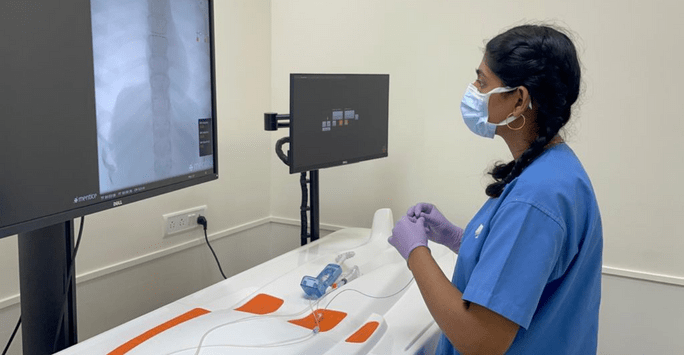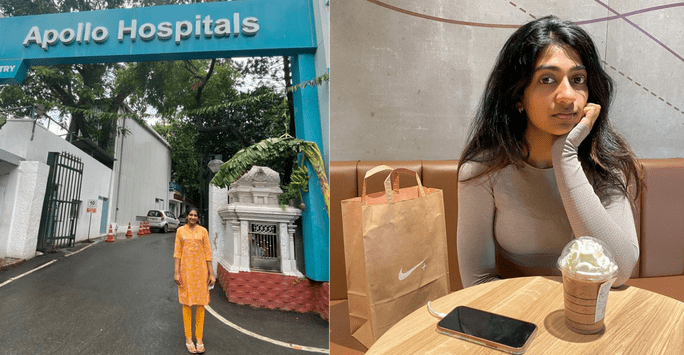
Year Three Student Meera Shankar took the opportunity to deepen her understanding of neurosurgery with a summer placement in India, supported by an undergraduate award she received from the Society of British Neurological Surgeons.
Meera was one of ten students selected nationally to receive the Society of British Neurological Surgeons Undergraduate Award (link) which includes a bursary of up to £500 to support undergraduate medical student education in Neurosurgery.
Meera’s time at one of Asia's foremost institutes for neurosurgery this summer provided her with a hands-on and educational insight into the latest innovations in neurology.
How did you find out about the award and what motivated you to apply?
I really enjoyed the neurosensory block in Year 2. Understanding the pathophysiology behind neurological disorders and solving diagnostic puzzles sparked my interest in the speciality. As someone who has always been passionate about surgery and working with my hands, I wanted to gain more insight into the life of a neurosurgeon and learn more about neurosurgical care internationally. This SBNS award would allowed me to do just that.
What did the application involve?
The application process was quite rigorous, but I was motivated to give it my best shot. I was keen to carry out a placement in India and learn more about their healthcare system, so I began to scout for learning opportunities and hospitals that offered cutting-edge technology and a wide spectrum of cases, including rare and advanced presentations.
I drafted a proposal with the objectives I hoped to achieve and submitted my CV to medical education departments. I was accepted to my top choice in India and started the paperwork to obtain clearances so I could have hands-on training. After I put together an indicative budget, I submitted my application and was lucky enough to be chosen as one of ten in the country to win the award!
What attracted you to the institute?
The Apollo Institute for Neurosciences is regarded as a leader for acute neurosurgical treatment in the world, receiving a high volume of cases per day and pioneering surgical and medical interventions.
I chose to work at a premier privately-funded hospital in India as I was interested in learning more about how this impacted healthcare delivery and how this compared to the NHS.
Due to differences in health literacy and cost of seeking treatment, patients in India tend to present at a much later stage and I had the rare opportunity to observe more advanced cases that I may not have had the chance to see in the United Kingdom. The neurosurgical team was experienced with training from all over the world and I got to be a part of a multi-disciplinary team and was involved in all aspects of perioperative care.
 Meera at the Apollo Institute this summer
Meera at the Apollo Institute this summer
What did you set out hoping to achieve?
One of my primary aims was to explore the application of technology and neurosurgical techniques in the urban setting of a developing economy. It was interesting to study India’s large medical tourism sector including patients from different parts of the country with various backgrounds and expectations. Affordability was a big factor in the choice of procedure as well as post-operative care. I got to work with patients who were unable to afford surgical treatment and helped plan treatment options based on each patient’s budget.
What are you most proud of?
My biggest highlight was learning and being able to run a neuro-trauma code and gain competency using robotic equipment intraoperatively.
Since the start of medical school, I have been fascinated by minimally invasive surgery and one of my proudest moments was being able to interact with the software and get comfortable applying it in the surgical field.
I wasn’t initially as good as I hoped I would be, I had to persevere and keep practicing until I got the hang of it. The world class simulation lab was a great environment to practice my skills and pick up handy tips from more experienced trainees.
Were there any challenges you came across?
The hospital I worked at catered to a diverse population and language was initially a learning curve for me. I was able to work with translators to interact with patients and overcome hurdles. The long hours and six-day work week took a bit of getting used to, but have certainly prepared me to for clinical placements going into Year 3!
What advice would you have for any students wishing to do something similar?
My biggest advice is to choose a hospital that offers the best learning opportunities, or exposure to state-of-the-art technology, or a place where healthcare delivery is completely different from what we are currently exposed to in the NHS. This award afforded me an incredible opportunity to experience all of the above and I was fortunate to have worked with a remarkable supervisor and mentors who really took an interest in teaching me and enriched my visit. I am very grateful to everyone who supported me every step of the way.
Discover more
- Learn more about the Society of British Neurological Surgeons Undergraduate Award (link) and how it could support your training in neurosurgery.
- Passionate about neurosciences? Why not join the NeuroSoc student society over on the Guild website (link).